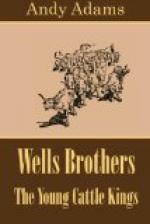The boys watched the cavalcade until it faded away in the swells of the plain. At each recurring departure of their friends, in spite of all bravado to the contrary, a pall of loneliness crept into the hearts of the waifs. Theirs had been a cheerless boyhood; shifted about from pillar to post, with poverty their one sure companion, they had tasted of the wormwood in advance of their years. Toys such as other lads played with for an hour and cast aside were unknown in their lives, and only the poor substitute for hoop, horse, or gun had been theirs. In the struggle for existence, human affection was almost denied them. A happy home they had never known, and the one memory of their childhood worthy of remembrance was the love of a mother, which arose like a lily in the mire of their lives, shedding its fragrance more fully as its loss was realized.
Joel was the more sensitive of the brothers. Forrest had fully discussed the coming winter with the older lad, and as an incentive to watchfulness had openly expressed doubt of the ability of the boys to battle with the elements. The conversation was depressing, and on the departure of the men, the boys resumed the discussion of the matter at issue.
“Mr. Quince thinks we can’t hold these cattle,” said Joel, watching the receding horsemen. “He’s afraid a storm will catch us several miles out and cut us off from reaching the corral. Well, it will be my fault if it does.”
Dell made a boastful remark, but the older boy only intensified his gaze at the fading cavalcade. A vision of his youthful sufferings flashed through his mind, and a mist, closely akin to tears, dimmed his eyes. He had learned the lesson that poverty teaches, unaware that the storm which rocks also roots the oak, but unable to make the comparison or draw the inference between surrounding nature and himself. For an instant the horsemen dipped from view, changing the scene, and a picture rose up, a vision of the future, of independence, of a day when he would take his place as a man among men. The past was beyond his control, its bridges burned, but the future was worth battling for; and as if encouraged by invisible helpers, the boy turned his face to the valley of the Beaver.
“We’ll hold these cattle or starve,” said he, unconsciously answering his gray-haired sponsor, fading from sight over the last divide. “Hold them. I can hold them alone.”
“There’s no danger of starving,” commented Dell, following his brother into the tent. “We have provisions for a year.”
“Then we’ll hold the herd or freeze,” answered Joel, almost hissing the words—words which became a slogan afterward.
The cattle drifted back to their chosen range. The late addition mixed and mingled with the others, now attached to the valley, with its abundance of grass and water. Nothing was said about the first four horses, from which the boys understood that they were, at least for the present, left in their charge. All told, sixteen horses, fully half of which were fit for saddle, were at the service of the ranch, ample in number in proportion to the cattle secured.




